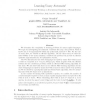Free Online Productivity Tools
i2Speak
i2Symbol
i2OCR
iTex2Img
iWeb2Print
iWeb2Shot
i2Type
iPdf2Split
iPdf2Merge
i2Bopomofo
i2Arabic
i2Style
i2Image
i2PDF
iLatex2Rtf
Sci2ools
110
click to vote
JALC
2007
2007
Learning Unary Automata
We determine the complexity of learning problems for unary regular languages. We begin by investigating the minimum consistent dfa (resp. nfa) problem which is known not to be approximable within any polynomial, unless P = NP. For the case of unary dfa’s, we exhibit an efficient algorithm. On the other hand, we show the intractability of the unary minimum consistent nfa problem but provide an efficient quadratic approximation for its optimization version. The VC dimension for the class of languages accepted by unary dfa’s with at most n states is computed as n + log n ± Θ(log log n), which (together with the efficient solution for the consistency problem) yields an efficient PAC learning algorithm for this class. We also show that there are no efficient PAC learning algorithms for the class of languages accepted by unary nfa’s with at most n states, unless every problem in NP is solvable by a quasipolynomial time Monte-Carlo algorithm. Here we assume that nfa’s with few stat...
Related Content
| Added | 15 Dec 2010 |
| Updated | 15 Dec 2010 |
| Type | Journal |
| Year | 2007 |
| Where | JALC |
| Authors | Gregor Gramlich, Ralf Herrmann |
Comments (0)

